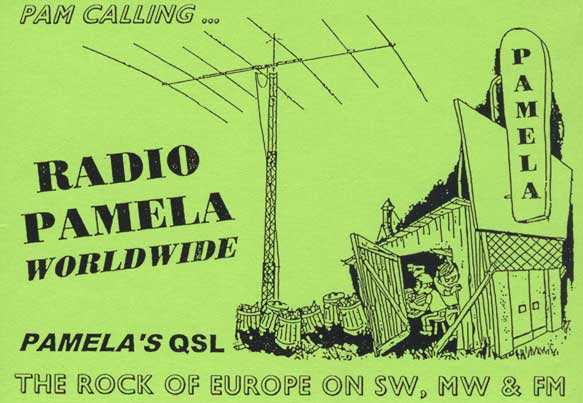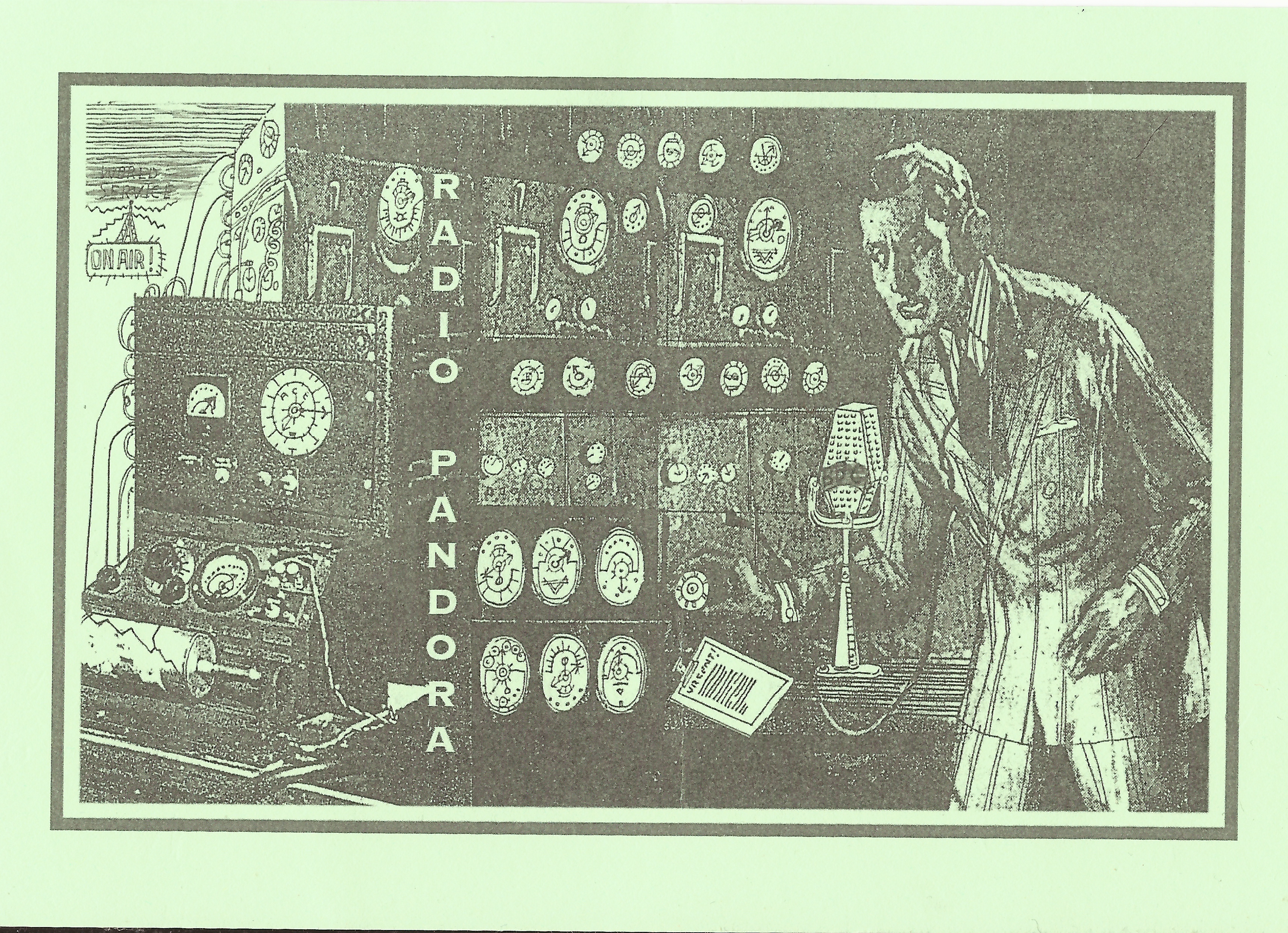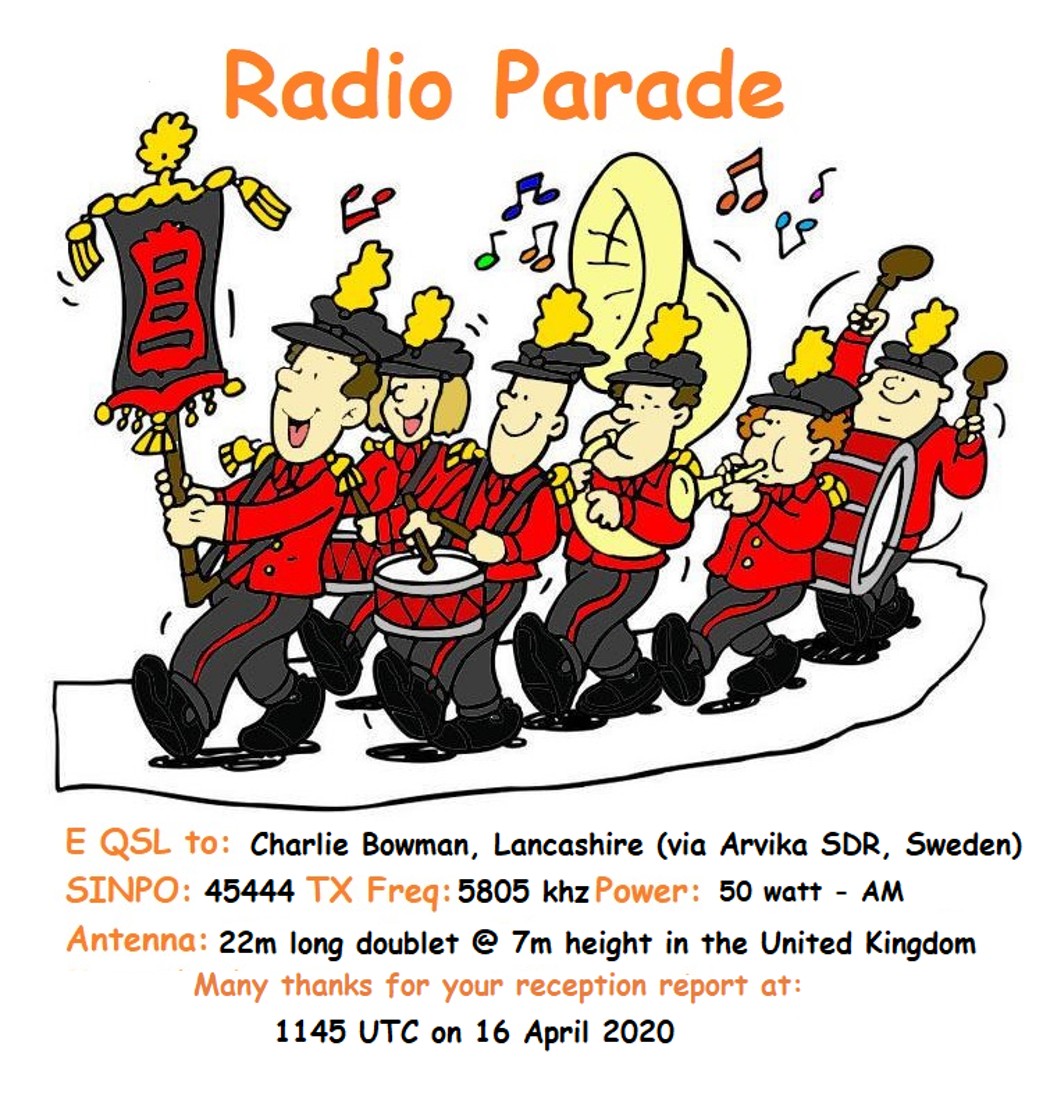FIRST PUBLISHED A YEAR AGO ON A DIFFERENT PLATFORM AND IN THE WAKE OF MY OWN PERSONAL EXPERIENCE WITH THE NOVEL CORONAVIRUS, THE FOLLOWING CHRONICLES AN ALMOST ENFORCED REINTRODUCTION TO UK-BASED FREE RADIO ON SHORTWAVE DURING A LENGTHY PERIOD OF CONVALESCENCE.
REPRESENTING THE FINAL POST OF AND A FITTING CONCLUSION TO THIS BLOG, MY WRITING STYLE AND THOUGHTS MAY SLIGHTLY DIFFER FROM MORE RECENT POSTS, BUT THE OVERALL MESSAGE REMAINS CONSTANT: THE 1990s WAS A GOLDEN PERIOD FOR FREE RADIO, PARTICULARLY IN THE EARLY YEARS OF THE DECADE, BUT ITS RISE, DECLINE, AND FALL VERY MUCH MIRRORED SOCIETAL CHANGES AND TECHNOLOGICAL ADVANCEMENTS THAT HAVE MADE LISTENING TO AND BROADCASTING ON 'GOOD OLD SHORTWAVE' SOMETHING OF A DYING ART, AND ARGUABLY A SOMEWHAT TWEE PASTIME.
MANY THANKS TO ALL WHO HAVE VIEWED, CONTRIBUTED, AND COMMENTED. ALTHOUGH THIS IS TECHNICALLY THE END, I STILL WELCOME ENGAGEMENT WITH ANYONE WHO LISTENED AND CONTRIBUTED TO THE RICH MOSAIC OF 1990s FREE RADIO, AND THOSE WITH A GENERAL INTEREST IN HOBBY PIRATES FROM ANY ERA.
___________________________________________________________________________________
Aged in my early teens in the Autumn of 1990, little could I have known that randomly tuning around the international shortwave bands on a basic analogue radio one Sunday morning would spark a hobby that has, albeit intermittently, endured to this day.
Already moderately aware of what could be heard using just a bog standard wireless and built in telescopic antenna, I was nevertheless surprised that Sunday morning to hear British(and Irish) accents and contemporary pop music in one specific area, the 48/49 metre band, approximately between 6100 - 6400 Khz. These 'stations' sounding more as if broadcasting from my neighbourhood than over the international broadcasting spectrum transpired to be pirate, or Free Radio operators, to correctly moniker the scene's preferred title.
The early days of UK pirate radio activity inevitably went hand in hand with offshore broadcasting, including the pioneering and most famous exponent of its genre, Radio Caroline. As broadcasting from ships was in reality the preserve and luxury of the few, transmitting from bedrooms, garden sheds, and out in the field, the latter seen as the least likely location to be detected, became the norm for hundreds, perhaps thousands of UK-based FM and shortwave stations. The three stations I first heard that October morning were to be no exception.
Of the tripartite of stations - Ozone Radio International, Radio 48, and Live Wire Radio - I became great friends but sadly lost contact with 'Mr. Live Wire'. Powering out a strong and stable signal which reached North America, this English-based operator became for many years a firm favourite amongst free radio aficionados for his initial broadcasts on the 6.6 MHz 'Echo Charlie' band before migrating to where most of the action lay on 48 and 76 metres, with also some notable broadcasts in FM mode on 15 MHz.
My interest in free radio continued to grow. Once it became apparent that these three stations were but the tip of the iceberg I dedicated my weekends, in particular Sunday mornings, to hearing, and contacting, as many operators as possible. Some great listening ensued, from the likes of Weekend Music Radio in Scotland, to Radio Confusion and its nominal successor Subterranean Sounds based in the south of England. With as many if not far more shortwave operators located in the Netherlands but relatively few elsewhere in continental Europe, I all of a sudden became a correspondent at 14-years of age with exotically sounding stations like Radio Orangutan, Ozone, and in the years to come Radio Fusion from Sweden, and the French-based Radio Waves International.
As my teenage life progressed and atmospheric conditions made listening at times in the mid-1990's almost impossible I increasingly dipped in and out of free radio, as did some of its higher profile operators. Some disappeared for good; others, like Live Wire Radio concentrated on medium wave broadcast amongst the many Dutch operators around 1636-1660 Khz and nighttime 3 MHz programmes. Perhaps it was often forgotten by listeners lamenting an absence of their favourite stations but operators too also have lives, relationships, and changes of circumstances just as we all do.
The early to mid 90's undoubtedly contained a golden generation of UK shortwave free radio stations, or, perhaps as a relative youngster had I been taken in by the notion that everything was better in the past, at least compared to our current technologically advanced but spiritually and morally bereft era? This isn't though a hagiographic depiction of life as it was, merely to paint a pejorative picture of modern life. Quite simply, be it a crop of footballers, pop groups, or free radio stations, clusters of those bound together by a shared passion and/or skill do without rhyme or reason inexplicably occur in tandem. It is not for us to ask why - there often isn't an answer - but to simply enjoy a period of time all the more fleeting before it eventually flies too close to the sun or circumstances get the better of it.
As atmospheric conditions fluctuate on a daily basis - something that has happened time immemorial - the one constant that hampered operators and listeners alike was an inexorable increase in background noise, electrical interference - call it what you will. The proliferation of electrical devices within households and subsequent everyday normalcy of handheld telephones has made conventional listening with a radio and longwire antenna a thing of frustration for those in built up areas.
The advent of Software Defined Radio(SDR) now enables listeners to hear stations wherever SDR receivers are located. Should for example an individual audience member based in Manchester find online an SDR located in Sweden, he or she can then hear the shortwave bands as if they were sitting back with a coffee and cigar in Stockholm, or wherever in Sweden the remote receiver happens to be based. Should a report be filed to the station its operator will then know that he is being heard in Sweden, albeit by a listener based in the north west of England. Is this cheating? Maybe, but if it helps keep the art of shortwave free radio alive I view this as one piece of modern technology that hasn't completely unromanticized the notion of the one man band, homebrew operator broadcasting from where, who know where, to be heard on a laptop or smartphone instead of more traditional equipment.
The current Covid-19 outbreak has for me been a twofold issue. Locked down, quarantined, call it what you will and what the population are having to endure is of course a problem for all, not just me. I also though succumbed to novel coronavirus, which heralded some dark, uncertain days before my eventual but slow recuperation took effect. This, and the generic lockdown has given me plenty of time to think, rest, fret, but also dip my toe back into the world of free radio.
Although sounding very different to its heyday I have enjoyed rolling back the years, both from the simple act of listening and being frustrated by trampolining conditions and stations that fail to identify themselves, but also hearing several operators that I haven't done so for years, or those who I have happened across purely because of my incapacitation.
A QSL card is a written confirmation from a station that the listener indeed heard its output, and something which became collectible in all sphere of radio listening. As a youngster I received by default many QSL cards from stations throughout the UK and overseas, including mainstream broadcasters Voice of Vietnam, Radio New Zealand International, and the Moscow-based Radio Peace and Progress. I never per se wrote to free radio operators as a QSL-hungry listener but more as a novelty of corresponding with the otherwise mysterious and faceless who took calculated or otherwise risks every time the rig was switched on.
This form of verification nevertheless found its way back from station operators to my mailbox, although sadly my archived collection has long since bitten the dust. Having though made contact during my Covid-19 hiatus with several UK and Irish stations, revisiting the 'back in the day' novelty of receiving QSL cards in real time has engendered strange feelings of nostalgia, but also those of simple enjoyment which in the grand scheme of modern life has become far more difficult, even to the point of ridicule.
Here are some of the recent QSL cards received during my enforced convalescence:

Radio Pamela's operation by free radio legend Steve Most predates even my earliest interest in the pirate scene. Although a periodic broadcaster Pamela has seemingly gained a new lease of life and can be often be heard, as 'she' was this morning, on 6940 Khz in the 43 metre band.

As one of the original 'classic' pirates of the golden 90's era, The Xenon Transmitting Company, or XTC, was first known as Radio Mutiny before adopting a more abstruse name squarely in keeping with the station operator's identity - Tommy Teabags. I have at times gone several years without hearing XTC, whose broadcasts prior to the pandemic were limited to bank holidays. As can be seen in the above QSL XTC has once more made several very welcome appearances on the 48 metre band, with special Lockdown Special shows! As the years catch up with us all and maturity casts a depressing but necessary shadow, Mr. Teabags has now reverted back to the less outlandish sobriquet of Matt Roberts, who first identified himself as such during the early days of Radio Mutiny.

The third QSL is also a fellow UK station of Pamela and XTC. Despite broadcasting since the mid-90's operator Steve St. John has only been heard by your correspondent perhaps on a dozen occasions, with atmospheric conditions and technical problems precluding good, or any, reception of Pandora's broadcasts. Despite approaching his 70th birthday the ever-chuckling Steve has recently been putting out some belting signals on 6322 Khz and can credit the technical expertise and advice of Live Wire Radio's former operator with such vastly improved signal and modulation.

Although present at various times during the last several months on the 76 and 48 metre bands, as well as 5.8 and 6.9 MHz, I hadn't previous to last week had the pleasure of officially hearing Radio Parade, another UK-based station. The obvious distinction I can make between Parade and most, if not all other free radio stations, is a particular fondness by Alex, the station operator, to broadcast instrumental, classical, and niche output. The power used and broadcasting setup, combined with the slightly higher frequencies favoured often results in Parade being barely audible in the UK, or at best heard via the North West Ireland Kiwi SDR remote receiver or that based in Arvika, Sweden. Identification is usually confirmed by sporadic canned announcements, although piano concertos and instrumental pieces act as ersatz and distinguishable points of reference.
It is impossible to say whether my rejuvenated interest in free radio will continue once fully recovered from my own brush with Covid-19, and that the strictures of lockdown have finally been loosened. It is certainly not a foregone conclusion to assume the pirate scene will always be there but in one guise or other, the 48 metre band will remain a constant to the many or few for some time yet. Fluctuations in quality and quantity of stations and atmospheric conditions are a given, but a resurgence in listening using conventional and/or SDR technology will hopefully encourage those operating to continue to do so, and perhaps too a new breed of operators to take the hobby into the next generation.




